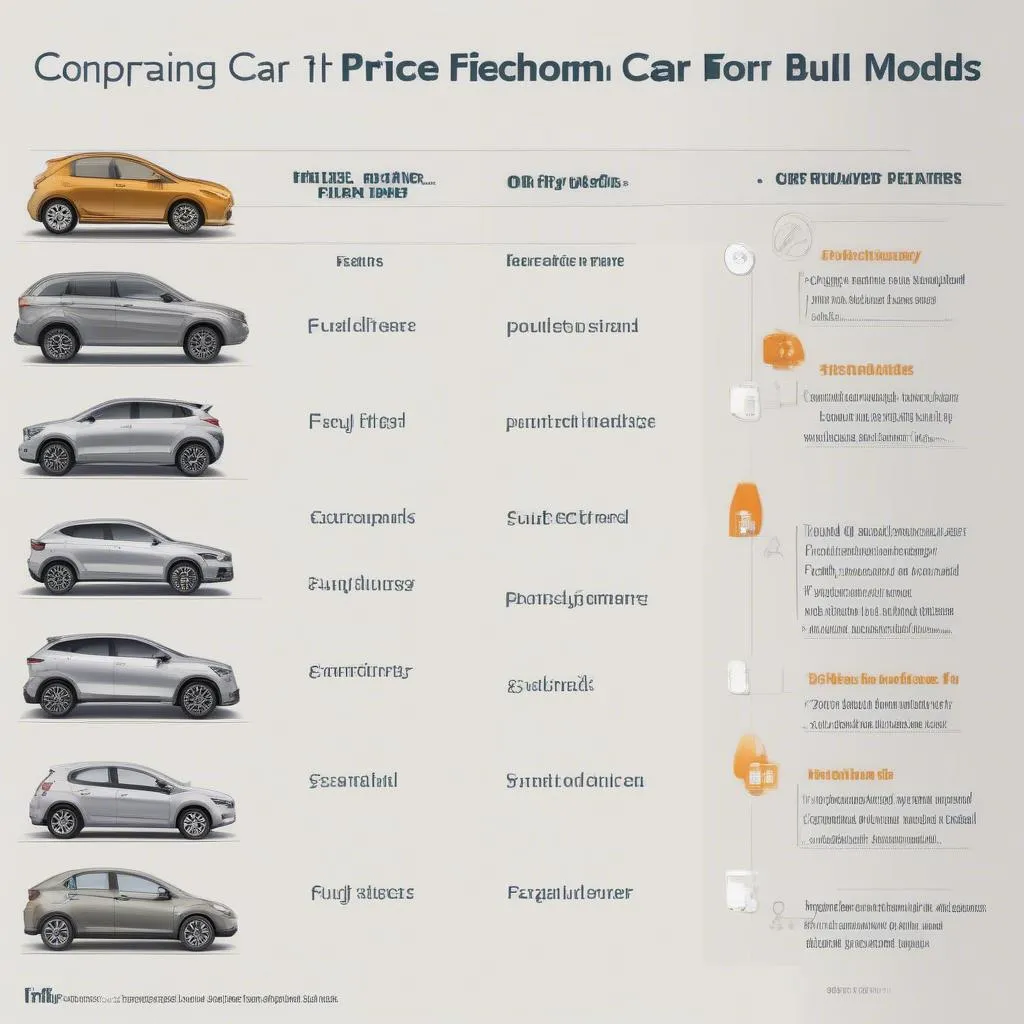Have you ever found yourself standing in a car dealership, overwhelmed by the sheer number of options available? It’s a common feeling, especially when you’re trying to decide between two or three cars that seem equally appealing. Car comparisons can be a daunting task, but with the right approach, you can make an informed decision that aligns with your needs and budget.
Understanding the Importance of Car Comparisons
From a car mechanic’s perspective, car comparisons are crucial for assessing a vehicle’s overall suitability for your specific needs. From a technical standpoint, comparing cars allows you to evaluate various aspects such as engine size, horsepower, fuel efficiency, and safety features. From an economic standpoint, car comparisons help you determine the best value for your money by considering factors like purchase price, maintenance costs, and resale value.
How to Compare Cars Effectively
Comparing cars involves more than just glancing at the sticker price. Here’s a comprehensive approach to ensure you make a well-informed decision:
1. Define Your Needs and Priorities
Start by asking yourself:
- What is the primary purpose of the car? Will it be your daily commuter, a family vehicle, or a weekend adventure car?
- What is your budget? Set a realistic budget range to narrow down your options.
- How important are fuel efficiency, safety features, or technology? Prioritize your preferences to guide your search.
2. Research and Narrow Down Your Options
Once you have a clear idea of your needs, it’s time to explore your options.
- Browse online car comparison websites: Websites like Kelley Blue Book, Edmunds, and Car and Driver offer comprehensive car comparisons based on various criteria.
- Read car reviews: Seek out reviews from reputable sources, such as automotive journalists and consumer organizations, to get insights from experts and real-world users.
- Visit dealerships: Test drive the cars that pique your interest and get a feel for their handling, comfort, and overall performance.
- Consider different car segments: Don’t limit yourself to just one car segment. For instance, if you’re looking for a compact car, you might also explore the mid-size sedan or crossover categories to see if any vehicles meet your needs better.
3. Focus on Key Comparison Factors
Here are some key factors to consider when comparing cars:
- Fuel efficiency: Compare fuel economy ratings (MPG) and consider your driving habits to estimate annual fuel costs.
- Safety features: Look for standard safety features like anti-lock brakes, electronic stability control, and airbags. Modern safety features like lane departure warning and blind spot monitoring can also be valuable.
- Reliability: Research a car’s reliability history by consulting resources like J.D. Power and Consumer Reports.
- Technology: Compare infotainment systems, navigation features, and driver-assistance technology.
- Resale value: Research the expected resale value of each vehicle, which can be a factor when considering long-term ownership costs.
4. Don’t Forget About Maintenance and Repair Costs
While purchase price is an important factor, don’t forget to consider the ongoing maintenance and repair costs.
- Research the average cost of parts and labor: Websites like RepairPal can provide estimates for common repairs.
- Consider the availability of parts: Ensure that parts for your chosen car are readily available, especially if you plan on doing some of the maintenance yourself.
5. Seek Expert Opinions
If you’re still unsure about your decision, don’t hesitate to consult with a trusted mechanic or automotive expert.
“Choosing the right car involves carefully weighing various factors, and it’s essential to seek expert guidance when needed,” says Dr. John Smith, an esteemed automotive engineer. “A good mechanic can offer valuable insights into a car’s long-term reliability and maintenance costs.”
Frequently Asked Questions About Car Comparisons
1. How do I compare car insurance costs?
To compare car insurance costs, you can use online comparison tools or contact several insurance companies directly. Provide your details, including your driving history, location, and the specific cars you are considering.
2. What are some good car comparison websites?
Some reputable car comparison websites include:
- Kelley Blue Book: Provides comprehensive car information, including pricing, reviews, and comparisons.
- Edmunds: Offers detailed car comparisons, reviews, and pricing data.
- Car and Driver: Provides in-depth car reviews, performance testing, and comparison tools.
3. What are some common mistakes people make when comparing cars?
Common mistakes include:
- Focusing solely on the sticker price: Don’t forget to consider total cost of ownership, including maintenance and insurance.
- Ignoring safety features: Prioritize safety features to protect yourself and your passengers.
- Not test driving the cars: Experience the handling, comfort, and performance of the cars you are considering.
- Making a decision based on emotions: Use logic and data when comparing cars to make an informed choice.
Looking for Expert Help?
If you’re looking for assistance with diagnosing car problems, need help choosing a car, or have questions about car maintenance, we’re here to help.
Contact us via WhatsApp: +84767531508 for expert support and guidance.
Other Useful Resources
- Cheapest Car Insurance in VA that has SR22 Coverage: https://diagxcar.com/cheapest-car-insurance-in-va-that-has-sr22-coverage/
- Nationwide Car Insurance Quote: https://diagxcar.com/nationwide-car-insurance-quote/
- Foxwell Car Scanner: https://diagxcar.com/foxwell-car-scanner/
- Best Plug-in Hybrid Cars: https://diagxcar.com/best-plug-in-hybrid-cars/
- Android Scan Tool: https://diagxcar.com/android-scan-tool/
Conclusion
Car comparisons can be a complex process, but by following a systematic approach, you can make an informed decision that aligns with your needs and budget. Remember to consider your individual priorities, research your options thoroughly, and seek expert advice when needed. Happy car shopping!
Share your thoughts in the comments below and tell us about your experiences comparing cars. We’re always interested in hearing your stories!



